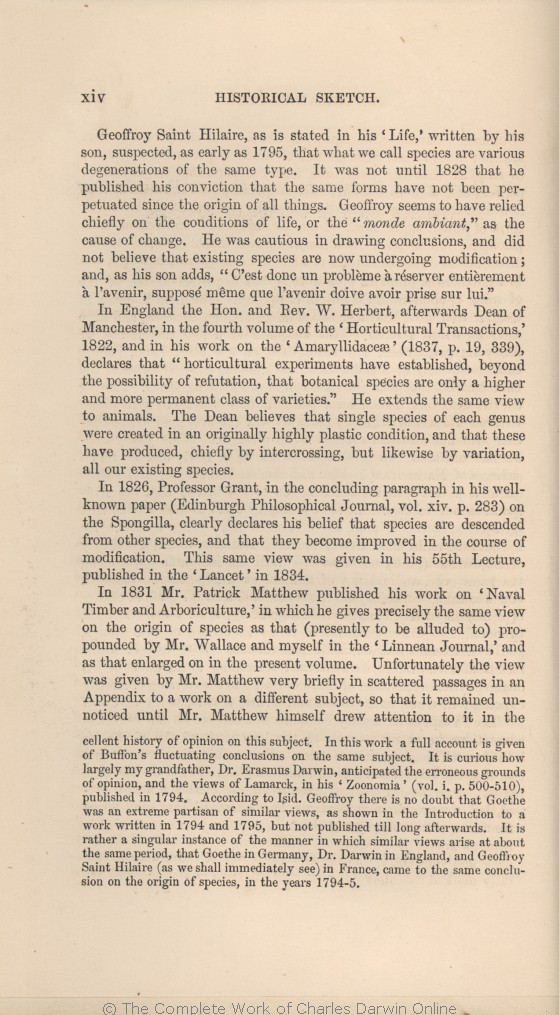Geoffroy
Saint Hilaire, as | Saint Hilaire, as 1861 1866 1869 |
| Saint-Hilaire, 1872 |
| is 1861 1866 1869 | | as is 1872 |
|
ambiant
,"
1861 | |
ambiant,
"
1866 1869 | |
ambiant
"
1872 |
| "C'est 1861 1866 1872 | | "C'ost 1869 |
| done 1861 1869 | | donc 1866 1872 |
| lui." 1861 1866 1869 |
| lui." — — — — — — — — — — — — — — — — 1872 |
| 5 blocks not present in 1861; present in 1866 1869 1872 | | In 1813
Dr. W. C. Wells read before the Royal Society 'An Account of a White Female, part of whose Skin
resembles that of a Negro;'
but his paper was not published until his famous 'Two Essays upon Dew and Single Vision' appeared in 1818.
In this paper he distinctly recognises the principle of natural selection, and this is the first recognition which has been indicated; but he applies it only to the races of man, and to certain characters alone.
After remarking that negroes and mulattoes enjoy an immunity from certain tropical diseases, he observes, firstly, that all animals tend to vary in some degree, and, secondly, that agriculturists improve their domesticated animals by selection; and then, he adds, but what is done in this latter case "by art, seems to be done with equal efficacy, though more slowly, by nature, in the formation of varieties of mankind,
fitted for the country which they inhabit. Of the accidental varieties of man, which would occur among the first few and scattered inhabitants of the middle regions of Africa, some one would be better fitted than the others to bear the diseases of the country. This race would consequently multiply, while the others would decrease; not only from their inability to sustain the attacks of disease, but from their incapacity of contending with their more vigorous neighbours. The colour of this vigorous race I take for granted, from what has been already said, would be dark. But the same disposition to form varieties still existing, a darker and a darker race would in the course of time occur;
and as the darkest would be the best fitted for the climate, this would at length become the most prevalent, if not the only race, in the particular country in which it had originated."
He then extends these same views to the white inhabitants of colder climates.
I am indebted to the Rev. Mr. Brace,
of the United States, for having called my attention
to
the above passage in Dr. Wells'
work.
|
|
In England the | In England the 1861 |
| The 1866 1869 1872 |
| 'Amaryllidaceæ' 1861 1866 1872 | | 'Amaryllidaccæ' 1869 |
|
In
1826, | 1826, 1861 | | 1826 1866 1869 1872 |
| Professor 1861 1866 1869 | | professor 1872 |
| (Edinburgh 1861 | | ('Edinburgh 1866 1869 1872 |
| Journal, 1861 | | Journal,' 1866 1869 1872 |
|









